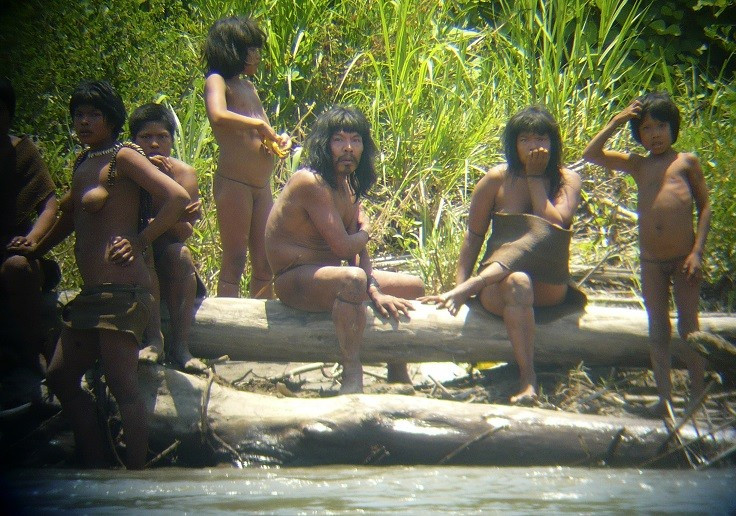Peru: Stone Age Mashco-Piro Tribe Ask for Bananas, Rope and Machetes in Three-Day Standoff with Rangers [VIDEOS]

An isolated tribe in the Peruvian rainforest have made contact with outsiders in what became a tense three-day standoff with rangers.
Over 100 members of the Mashco-Piro tribe appeared across the Las Piedras river from the remote community of Monte Salvado and asked for bananas, rope and machetes from another local tribe.
They stayed at the riverside for three days. Authorities were puzzled as to why they had suddenly made contact but speculated that the tribe might have been upset about illegal logging and drug smuggling in their territory.
Klaus Quicque, president of the regional Native Federation of Madre de Dios, said the Mascho-Piro tribe asked for the supplies from the local Yine people but were stopped from crossing the river by rangers at the settlement.
Quicque said he directed them to a banana patch on their side of the river. The incident, filmed by a ranger, shows armed tribe members of all ages and sexes trying to cross the river to Monte Salvado.
"You can see in the images there was a lot of threatening - the intention of crossing. They practically reached midriver," Quicque said.
In one particularly tense moment, the footage shows a man flexing his bow, ready to shoot.
Quicque said the people living in Monte Salvado feared for their lives. At the peak of the standoff, an estimated 110 Mascho-Piro tribespeople were present at the river.
Increasingly less isolated
The tribe has since left and has not returned. Quicque credited one of the rangers, named Rommel Ponciano, for calming the situation. He said the tribe spoke a "variant of Yine" and that Ponciano understood most of what they were saying.
Beatriz Huertas, an anthropologist who works with Peru's agency for indigenous affairs, said the Mashco-Piro people are becoming increasingly less isolated. She said it is not unusual for them to appear at the river they appeared at during times of sparse rainfall.
"What's strange is that they came so close to the population of Monte Salvado. It could be they are upset by problems of others taking advantage of resources in their territories and for that reason were demanding objects and food of the population," she said.
Mashco-Piro were last seen in May 2011 when they appeared at the banks of a different river. This was the first time they had made contact for more than 20 years. Later that year, the tribe was blamed for wounding a forest ranger and killing a Matsiguenka Indian, who had a relationship with the tribe and provided them with machetes and cooking pots.
The Mashco-Piro operate under their own social codes. Carlos Soria, the former head of Peru's park protection agency, said this includes kidnapping women and children from other tribes.
© Copyright IBTimes 2025. All rights reserved.




















